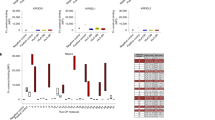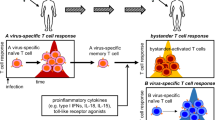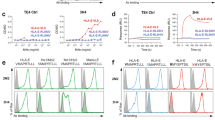Abstract
Class I HLA (histocompatibility locus antigen) molecules are the targets of allospecific cytolytic T lymphocytes (CTL) in graft rejection, and constitute the restricting elements necessary for the interaction between antiviral CTL and virus-infected cells. Cells expressing only one HLA in the absence of other human molecules would provide a remarkable model for studying the function of these molecules. However, HLA+ murine cells transfected with human genes1–5 are generally not lysed by allospecific human CTL5–8, and this is ascribed to insufficient HLA expression, lack of human β2-microglobulin, alteration of HLA molecules or absence of receptors for human T8 or LFA1 molecules in murine cells6–8. Here we report, for the first time, the specific lysis of virus-infected HLA+ murine cells by HLA-restricted antiviral human CTL. Therefore, these murine cells constitute an excellent model for studying the role of HLA molecules.
This is a preview of subscription content, access via your institution
Access options
Subscribe to this journal
Receive 51 print issues and online access
$199.00 per year
only $3.90 per issue
Buy this article
- Purchase on Springer Link
- Instant access to full article PDF
Prices may be subject to local taxes which are calculated during checkout
Similar content being viewed by others
References
Lemonnier, F. A. et al. Immunogenetics 16, 355–362 (1982).
Barbosa, J. A. et al. Proc. natn. Acad. Sci. U.S.A. 79, 6327–6331 (1982).
Kavathas, P. & Herzenberg, L. A. Proc. natn. Acad. Sci. U.S.A. 80, 524–528 (1983).
Herman, A., Parham, P., Weissman, S. M. & Engelhard, V. H. Proc. natn. Acad. Sci. U.S.A. 80, 5056–5060 (1983).
Berbabeu, C. et al. J. Immun. 131, 2032–2037 (1983).
Barbosa, J. A. et al. Proc. natn. Acad. Scci.U.S.A. 81, 7549–7553 (1984).
Van de Rijn, M. et al. Science 226, 1083–1085 (1984).
Bernabeu, C. et al. J. Immun. 133, 3188–3196 (1984).
Van Pel, A., De Plaen, E. & Boon, T. Somat. Cell molec. Genet. (in the press).
Koller, B. H. & Orr, H. T. J. Immun. 134, 2727–2733 (1985).
Paul, P. et al. Immunogenetics (in the press).
Toubert, A. et al. Immunogenetics 20, 513–525 (1984).
Gomard, E., Witbon, M., Toubert, A., Begue, B. & Lévy, J. F. Immunogenetics 20, 197–204 (1984).
Henin, Y. et al. Immunogenetics (in the press).
Maryanski, J. L. et al. Eur. J. Immun. (in the press).
Achour, A. et al. Eur. J. Immun. (submitted).
Cowan, E. P., Coligan, J. E. & Biddison, W. E. Proc. natn. Acad. sci. U.S.A. (in the press).
Wigier, M., Pellicer, A., Silverstein, S. & Axel, R. Cell 14, 725–731 (1978).
Litzkas, P., Jha, K. K. & Ozez, H. L. Molec. cell. Biol. 4, 2549–2552 (1984).
Author information
Authors and Affiliations
Rights and permissions
About this article
Cite this article
Gomard, E., Begue, B., Sodoyer, S. et al. Murine cells expressing an HLA molecule are specifically lysed by HLA-restricted antiviral human T cells. Nature 319, 153–154 (1986). https://doi.org/10.1038/319153a0
Received:
Accepted:
Issue Date:
DOI: https://doi.org/10.1038/319153a0
This article is cited by
-
Improved Transgenic Mouse Model for Studying HLA Class I Antigen Presentation
Scientific Reports (2016)
-
H—2-restricted cytolytic T cells specific for HLA can recognize a synthetic HLA peptide
Nature (1986)
Comments
By submitting a comment you agree to abide by our Terms and Community Guidelines. If you find something abusive or that does not comply with our terms or guidelines please flag it as inappropriate.



